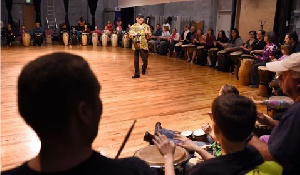Diasporia News of Thursday, 28 January 2016
Source: magicvalley.com
Ensemble takes drumming, dance from Ghana to Twin Falls
When Scott Farkas started working at the College of Southern Idaho, he began trying to arrange for his former African drumming teacher’s group to perform in Twin Falls.
That was four years ago.
Farkas, a percussion instructor, stood outside the CSI Auditorium Wednesday night as the sound of drumming permeated the hallway. The rhythm started slow and picked up to an almost frenzied pace.
“This is so exciting to see how much of the community has opened up to this,” Farkas said with a grin on his face. “It’s going to be a great party in there.”
African drumming and dance ensemble Saakumu will perform at 7:30 p.m. Thursday on the CSI Auditorium stage for the fourth performance of the Arts on Tour season. Master musician Bernard Woma — Farkas’ former teacher at State University of New York at Fredonia — leads the group in its repertoire that includes spiritual, ceremonial and recreational genres and contemporary African dance forms.
Woma held a community workshop Wednesday night to teach members of the public techniques of African drumming and dancing. More than 40 people signed up and participated in the class. They formed a semi-circle around Woma, each at their own drum of various sizes and shapes.
“Whether you are a drummer or not, or a musician or not, we will teach you,” Woma said told the group. “When you make a mistake don’t feel bad, it’s just a new style. Just don’t make too many new styles.”
Members of Saakumu Dance Troupe have been in Twin Falls all week holding music and drumming classes with CSI theater students, performing for local high schools and holding a master class for music students at Twin Falls High School. The visit is the first time Woma has traveled to Idaho.
“He’s trying to spread the tradition of the world he grew up in,” Farkas said. “Any time that takes hold somewhere, that’s good."
Woma began the lesson by teaching workshop attendees Kpanlogo, a recreational dance and music from Ghana. He gave them tips for playing: Don’t rest your whole back on the chair. Make sure your shoulders are relaxed.
“If you can talk, you can sing," he said. "If you can walk, you can dance."
And where there is music, there is dancing. But when people tell him that they can’t dance, his response may make them rethink their skills.
“Do you walk like this?” he said, dragging his leg, as some of his students laughed.
Woma is the founder and director of Dagara Music Center in Ghana, a school that teaches traditional art and culture to people from all around the world. In addition to drumming and dancing, Woma is also a master of the Ghanaian Xylophone. He has performed with the New York Philharmonic at the Lincoln Center for international dignitaries and presidents including President Bill Clinton, Nelson Mandela and Queen Elizabeth II.
Sara Pettit of Hailey brought her two young children to the workshop. She said she surprised how quickly she caught on.
“Wow, I could have been learning to do this a long time ago,” Pettit said. “It’s about bringing community together and even if you are not drumming, you feel it in your bones, and it’s powerful.”
That's the beauty of African drumming, Farkas said. It’s easy to learn and play, but you can also go deeper into the details and variations of sound.
And if you want to learn, Woma is the person to go to.
“He’s like a master teacher," Farkas said. "There is no wasted gestures or words. It all directs you to the end goal."
Before Mary Hopkins of Twin Falls and her granddaughter Diemry Wolters, 7, left the workshop Wednesday night, they purchased a handmade snakeskin drum that Diemry would practice on at home.
The two also planned to return to Thursday's performance to see the whole Saakumu Dance Troupe on stage.
“This is just wonderful for the children to help them develop rhythm, focus and counting to a beat,” Hopkins said. “You listen with your ear and your hands automatically pick up the beat. It’s really relaxing.”











